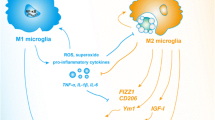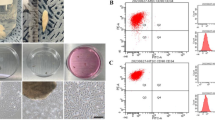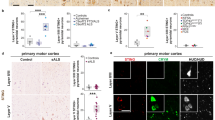Abstract
Activated microglia play an important role in the rejection of intracerebral grafts and the degeneration of axotomized neurones. We studied the effect of macrophage migration stimulatory factor (MSF) or macrophage migration inhibitory factor (MIF) on allogeneic foetal mesencephalic dopaminergic grafts transplanted into the striatum of 6-hydroxydopamine-lesioned rats. Rotation testing revealed a significant compensation of lesion-induced motor asymmetry 3 weeks post-grafting in animals treated with MIF and vehicle-treated controls compared with pre-graft values (Student′s t-test, P≤0.005) and MSF-treated animals (ANOVA, post hoc Fisher PLSD test, P≤0.05). The MSF group showed no significant compensation. Graft recipients with MIF application (1452.06 ± 164.32 tyrosine hydroxylase-positive ventral mesencephalic cells) and controls (1753.21 ± 165.51 tyrosine hydroxylase-positive neurones) displayed good graft survival. Animals with MSF application showed a significant reduction of tyrosine hydroxylase-positive grafted cells (MSF 570.36 ± 209.49 cells) and graft volumes compared with the MIF and the control group (ANOVA, post hoc Fisher PLSD test, P≤0.05). The propotional area of microglia was significantly reduced in MIF animals compared with control animals (ANOVA, post hoc Fisher PLSD test, P≤0.001). Activated microglia and macrophages were reduced by half in the MIF-treated group compared with MSF animals and controls. We conclude that intrastriatal injections of MSF result in impaired function and survival of allogeneic ventral mesencephalon (VM) grafts 3 weeks after transplantation. MIF can reduce the number of microglia and macrophages in allogeneic foetal VM grafts. A reduction of microglia via MIF application did not enhance graft function and survival.
Similar content being viewed by others
Author information
Authors and Affiliations
Additional information
Received: 7 January 1997 / Accepted: 19 September 1997
Rights and permissions
About this article
Cite this article
Schwarz, S., Schwarz, J., Sautter, J. et al. Effects of macrophage migration inhibitory factor and macrophage migration stimulatory factor on function and survival of foetal dopaminergic grafts in the 6-hydroxydopamine rat model of Parkinson′s disease. Exp Brain Res 120, 95–103 (1998). https://doi.org/10.1007/s002210050381
Issue Date:
DOI: https://doi.org/10.1007/s002210050381




